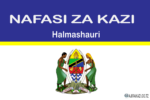AboutPARLIAMENT OF TANZANIA
The National Assembly of Tanzania was established before independence in 1926 as Legislative Council of Tanzania Mainland, then known as Tanganyika. The Legislative Council was established under Tanganyika Legislative Council Order and Council, a law enacted by the British Parliament. The law was gazetted in Tanganyika on 18th June 1926 and the council was launched in Dar es Salaam on 7th December 1926 under the chairmanship of the Governor of Tanganyika, Sir. Donald Cameron. The council had 20 members all appointed by the Governor.
The first major change to the Legislative Council was done in 1953 when the first Speaker was appointed to replace the Governor as chairman of the council. The first speaker took office on 1st November 1953.
The second major change was in 1958 when for the first time the Council got few members elected by the people. This marked a very big change in the politics of Tanganyika because it was the first election to be allowed in the colony and it was the first time political parties – that were already registered – participated in elections. Three political parties participated in those elections namely, Tanganyika African Union (TANU), United Tanganyika Party (UTP) and African National Congress (ANC). However, only TANU won in some constituencies to become the first party to have members in the Legislative Council.
The third major change to the Legislative Council occurred in 1960 when the second elections of the council were held. The changes were part of preparations for the independence of Tanganyika. For the first time the people elected all members of the council after abolishment of all members appointed by the Governor. The name of the Legislative Council was changed to National Assembly. These changes were constitutionally necessary because the Queen of England or Head of the British Government accented the laws enacted by the Legislative Council. Changes to National Assembly meant that after independence the laws passed would not be sent to England for accent. Instead, the President of independent Tanganyika would accent all the laws.
Since change of name to National Assembly there have been few changes especially on the number and type of members. Nevertheless, its role and mandate has remained the same.






